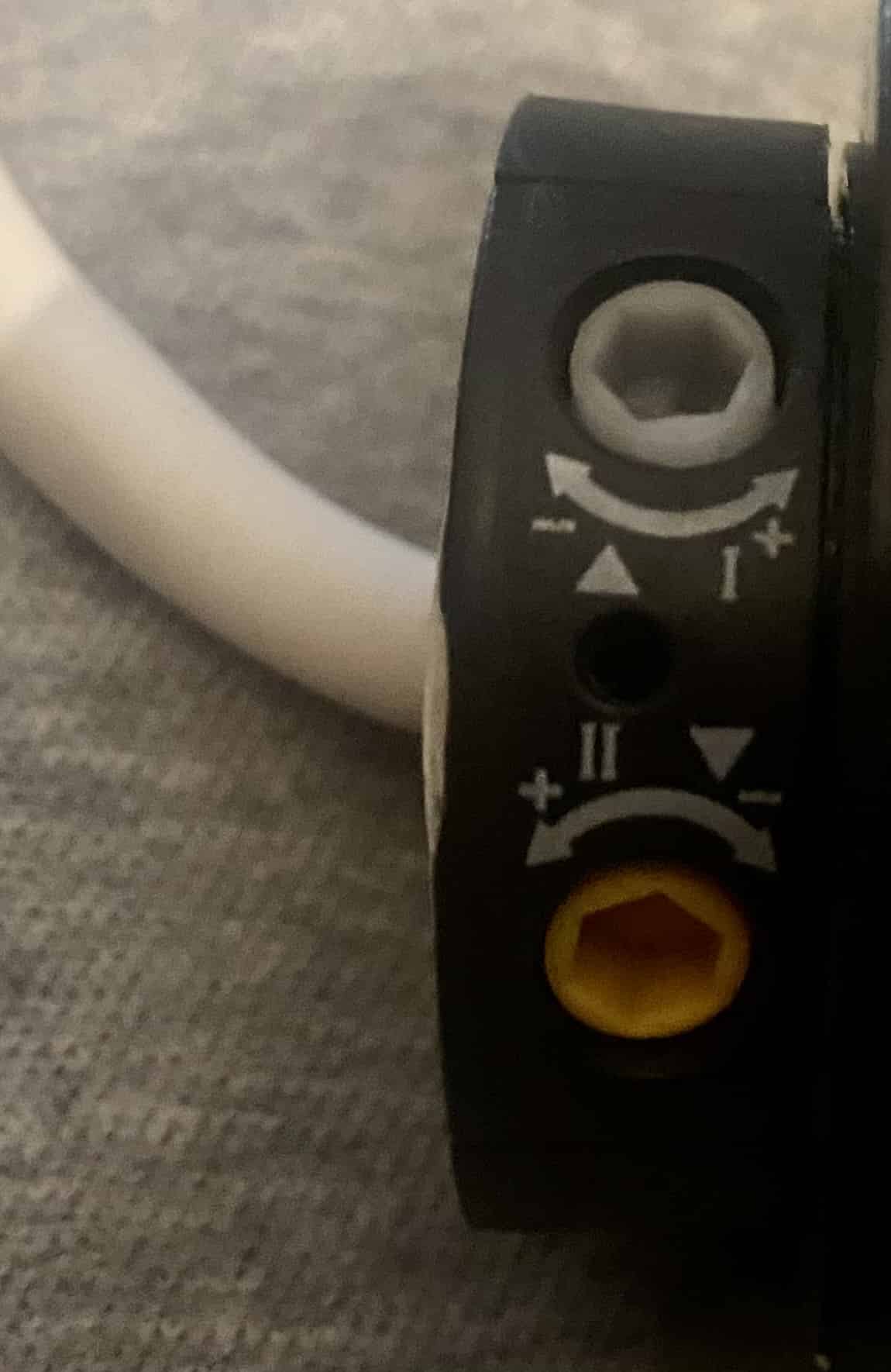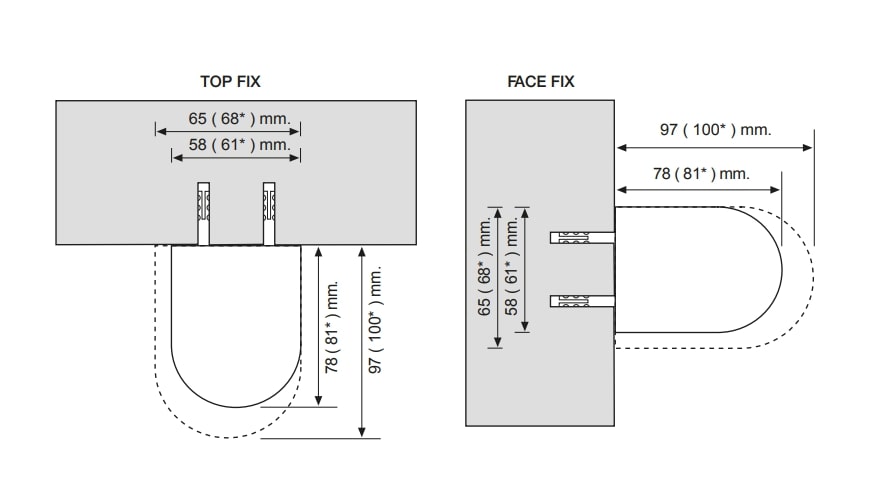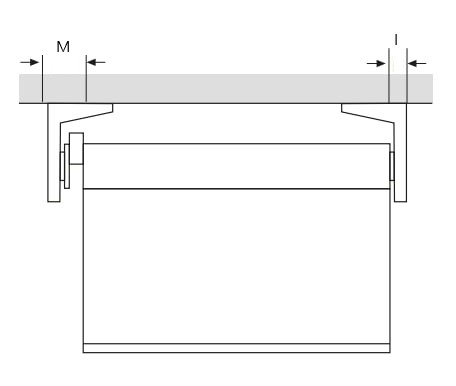



VISTA FR WHITE 3m 230v Relay Operated Electric Roller Blinds
SKU: R-230W-EN.VIS.300.001
- Premium SWIFTPRO Roller Blind system
- Chose from two excellent quality motors:
- SOMFY 230vAC Quiet Relay Operated motor (3-core cable)
- CLASSIQUE-EDI 230vAC Quiet Relay operated motor (4-core cable)
- Ideal for wired integration with smart home systems
- Choice of hem bar finishes
- Order FREE fabric samples
Measuring and Installation is Simple: Download our Measuring Guide (PDF)
VISTA FR WHITE 3m 230v Relay Operated Electric Roller Blinds
Operation Method
From £188.95
Sample added
Delivery: 4 weeks
NEWBLINDS 230vAC Quiet Relay Operated Motor
Our NEWBLINDS 230vAC Quiet Relay operated motor comes come prepared with 2m of 4-core cable for 230v power supply and control. The pre-fitted motor cable incorporates a male/female connector 15cm from the head of the motor, which allows the motor to be easily disconnected once wired-in, without requiring a qualified electrician. Limits are mechanical and are set and adjusted at the head of the motor using an allen key style tool.
SOMFY 230vAC Quiet Relay Operated Motor
SOMFY's Sonesse 40 WT motor is a 230vAC relay operated motor with mechanical limits and the quiet operation you would expect from a Somfy motor. Upper and lower limits are set mechanically at the motor head. The 3-core cable can be wired back to a controlling relay. It is important as with all mechanical relay operated motors that multiple blind motors are not cabled back to a single relay unit.
Standard Blind Options
Blinds are manufactured using our premium SWIFTPRO roller blind system. Available to order online, there are a range of finishing touches including:
-Fabric Roll: from the window side of the tube or on the room side of the tube.
-Choice of Bottom Bar - including fabric covered, exposed circular aluminium in white, silver-grey or black.
-Choice of motor position - The motor sits inside the roller blind tube and can go on either side of the blind.
Enhanced Blind Options
In addition to those options available on-line, we have the following options which are available via our estimates team:
- Fixing Profiles and Pelmets in White, Silver-Grey and Black
- SWIFTBOX Fascia - covering the front and bottom of the blind tube and brackets
- Intermediate Brackets - allowing 2 blinds to be installed side-by-side, using a single central bracket.
- Double brackets - one bind fitted behind another (e.g. blackout and privacy)
- SWIFTPOCKET - conceal your blind above ceiling level using our recess pocket sytem
For more information about these options - please contact our estimates team by filling out our project enquiry form.
Roller Tube Selection
Blinds up to (and including) 2400mm wide will be manufactured with a 43mm outside diameter tube. To prevent tube deflection and fabric sag, blinds above 2400mm wide will use our 56mm outside diameter tube. Please note that a blind using a 56mm roller tube will operate at a slightly faster speed than a blind using a 43mm tube.
Order Free Fabric Samples
Don't forget that you can order free samples of fabric, which will be sent by first class post
Smart Home Integration
Blinds using relay operated motors can be integrated with many brands of smart home automation system that use simple blind control relays. Examples of compatible smart home systems include Fibaro, Lightwave, Control4, Crestron, KNX.
Measuring
See our guide to measuring roller blinds (clicking this link opens a new window).
VISTA FR
Vista FR is an extra-wide blind fabric that provides an integrated motor for easy use. With a 3m roll-width and providing privacy and sun protection, Vista is available in a range of popular colours. This fabric is ideal for extra-large windows such as bi-fold doors. It is fire retardant and 100% Polyester.
- Blind Type: Electric Roller Blinds
- Motor Power: Mains Power
- Motor Brand:
- SOMFY
- newblinds.co.uk
- Control Options: Smart Homes System
- Maximum Width:
- Up to 2m
- Above 2.5m
- Above 2m
- Fabric Colour: White
- Fabric Design: Plain
- Blind Feature:
- Motorised
- Child Safe
- Cordless
- Flame Retardant
- Privacy
- Light Control: Dim Out
- View Out: Opaque
- Fabric Brand: Newblinds.co.uk
- Material: Polyester
- Fixing Method: Screw Fix
- Operation: Motorised
- Motor Type: 230vAC Relay Operation
- Window Type:
- Door
- Sliding Door
- Bi Fold Door
- French Doors
- Window
- Bay Window
- Patio Door
- Room:
- Kitchen
- Office
- Dining Room
- Living Room
| File Name | Size | Date | |
|---|---|---|---|
| Fabric-Card---VISTA-FR.pdfDownload | 886.1 KB | 04/11/2023 | |
| Instructions---Roller-Blinds---Soft-SwiftPro-Strong.pdfDownload | 1.09 MB | 04/11/2023 | |
| Technical-Specification-SWIFTPRO-Roller-Blinds-Motor.pdfDownload | 227.19 KB | 04/11/2023 | |
| Cabling-Power-Limit-Setting-Guide-230v-Relay-Operated-Motors-4-core-.pdfDownload | 587.83 KB | 04/11/2023 |
What is a relay operated electric roller blind?
A relay operated roller blind is a roller blind incorporating a motor that is controlled by wire using a blind control (also known as a relay). A mains relay unit provides directional power at 230vAC to switch your blind up and down.
How to control relay operated blinds?
To control a relay operated roller blind, there will need to be in place a wired blind controller, which is also often referred to as a relay. Blind controls are often provided (or purchased) as part of smart home systems or a building management system (BMS). Commonly, one blind control unit can contain one or multiple switching relays. For example, a blind controller can have 1, 2, or 4 relays. Each relay should be used to control a single blind.
What smart home or BMS brands are relay operated blinds compatible with?
Operation by a relay is a very well established method of control. So most brands of smart home systems and BMS offer compatible blind relays. These brands range from established high-value smart home systems such as Lutron, Crestron, Control4, KNX and RAKO to a newer breed of more "DIY" modular systems such as Lightwave and Fibaro.
Can relay operated blinds be controlled with a handset?
No, relay operated blinds cannot be controlled using wireless controllers such as radio or infrared handsets.
Can relay operated electric blinds be controlled by Amazon Alexa or Google Assistant?
If your relay operated blinds are going to be controlled by a smart home system, then the smart home brand that you are working with may well be compatible with a voice assistant like Alexa or Google assistant. Examples of smart home brands that work with Alexa are Control4 and Fibaro. We'd advise you to consult your smart home supplier or installer to confirm this.
What are the advantages of relay operated blinds?
The key advantages of a relay operated blind system are cost, simplicity, reliability and range. You can read a more detailed answer to this question in our article "Why choose relay operated electric blinds?"
What are the disadvantages of relay operated roller blinds?
If you are planning on using electric blinds in conjunction with a smart homes system or building management system, then relay operated blinds are a good solution. However there are some planning, budgetary and functionality considerations you will need to take into account. These considerations will become disadvantages if you do not address them at early on in the process of your build or renovation. You can read more about this also in our blog post "Why choose relay operated electric blinds?".
How do I measure for relay operated electric roller blinds?
You can see instructions for measuring for blinds at the link. Please bear in mind that the widest point of a roller blind is the top - so we'd advise paying particular attention to the width at the top of the recess. It's no problem for a roller blind to be too big on the drop as the excess fabric can simply remain on the tube!
How do I fit electric roller blinds?
So in terms of fitting the blinds themselves, you can refer to these electric blinds fitting instructions, which are specific to our SWIFTPRO system featured on this product page. You should also consider that there are a couple of other aspects to the correct installation of a relay-operated roller blind - namely the cabling, the connections and the configuration of the blind. These are covered in more detail in the remaining questions below.
Will my blind motor cable come fitted with a plug?
No, relay operated blinds do not have fitted with a plug, because the cable of the motor is used to both power and control the blind. The cable needs to be wired back to a blind relay which will provide directional power to switch the motor.
What cabling is required for relay operated electric blinds?
We have a choice of two motors for our relay operated roller blinds. Somfy Sonesse 40 WT motors come with a 3-core cable. NEWBLINDS Quiet relay motor has a 4-core cable.
Our NEWBLINDS Relay Operated Motors have a 4-core cable. You will need a blind control that is capable of switching a 4-core cable. The colour-coding of the individual cores are as follows:
- Blue = Neutral
- Brown = Direction 1
- Black = Direction 2
- Yellow / Green = Earth
Somfy Sonesse 40 WT motors do not have an earth cable, so only have 3-cores, but the colouring is otherwise the same.
We would suggest running a 4-core cable from the location of the relay to the head of the window where each blind will be fitted. Motors can be positioned at either the left or the right-hand side of the blind. Ideally, the cable should enter the recess behind the motor end bracket.
We suggest 4-core because this “future proofs” your cabling should you wish to change to a different specification of motor.
Can the cable on a relay operated blind motor be trimmed?
Yes, the cable can be trimmed. Please bear in mind, our NEWBLINDS 230vAC Quiet Relay operated motor comes prepared with 2m of 4-core cable for 230v power supply and control. This cable incorporates a male/female connector 15cm from the head of the motor, which allows the motor to be easily disconnected once wired-in, without requiring a qualified electrician.
Can I connect more than one blind to a single relay?
If you are planning to use relay operated roller blinds in your blinds project, then it is key that at the planning stage you consider that each blind needs to be switched individually by its own relay. If you connect more than one blind back to a single relay, the blinds will not operate correctly - they may exhibit what is often called 'yoyoing, which is when the blinds bounce up and down. Also, upper and lower and limits are lost over time.
What size fuse do I need for electric blinds?
The rated current in the motors used in our mains powered roller blinds is usually 0.5-0.6 Amp, and they have a power rating of between 90-130W. If your blind relay requires a fuse then a 3 amp fuse will be sufficient to protect the cabling and motor.
Who can install a relay operated electric blind?
It's important to consider the installation of electric blinds in terms of the discrete processes involved:
- Measuring - most people can do this part themselves. However, we'd always chanting our matra whilst doing so "measure twice, buy once". If you don't feel comfortable with this then maybe try a local handyman or skilled friend!
- Installation of mains power, cabling and fused spurs - This is a job for a qualified electrician.
- Installation and configuration of the blinds - As with measuring, a competent DIYer is more than capable of installing blinds, and if you are tech-savvy then the configuration of the blinds should be straightforward for you.
- Connection of the blind to power/control cabling would normally be carried out by an electrician or a competent individual.
- Integration of the blind with smart home or building management system - meaning configuring your system to operate the blinds. For some systems, such as Control4, Crestron, Lutron, this will be a job for a smart home technician. Some home automation systems, such as Fibaro or Lightwave are more suited at the DIY market.
How do I programme relay operated roller blinds?
Before connecting your motor cable to your blind relay, you will need to set the top and lower limits of the blind. This prevents the blind from over-running in either direction and possibly causing damage to the blind itself.
Relay operated blind limits are mechanical and are set and adjusted at the head of the motor (see image below) using an allen key style tool. The limits can be adjusted separately. Turning the limit key to the minus symbol reduces the travel of the blind. Turning towards the plus symbol allows the blind to travel further. You can read a more detailed guide to limit setting of relay operated motorised blinds by following the link.

What size are electric roller blind brackets?
As shown in the diagram below, our SWIFTPRO roller blinds use brackets that project 81mm and have a footprint of 61mm. These sizes include the bracket covers. They can either be top fixed or face fixed. There is a larger bracket available, but this is only necessary for blinds with a very large drop. You can see full details of the SWIFTPRO Roller Blind system by following the link to a full technical specification.

What size is the gap on each side of an electric roller blind?
It's important to understand that if you are fitting within a recess, there will be a gap between the recess walls and where the fabric begins. First of all, if you provide "recess sizes", we make a deduction of around 4mm to reach "blind size". This is so that the blind can fit comfortably within the recess. For a roller blind, the blind size (for the width) is the width of the blind from the outside of the left-hand bracket to the outside of the right-hand bracket. Where your blind has bracket covers, these bracket covers will be included in this measurement.
The largest gap is at the motor end of the blind (See M in the diagram below). Between the outside of the bracket and the fabric, you will find the bracket itself and the motor-head - the majority of the motor is concealed within the tube of the roller blind.
And at the idle end (See I in the diagram below), there is the bracket itself and a collapsible pin that locates that end of the blind into the bracket.
So, measuring from outside of the bracket (inc. cover) to the fabric, the sizes of the resulting gaps on each side are approximately:
- Idle end (I): 13mm
- Motor end (M):
- Somfy Sonesse 40 WT: 23mm
- NEWBLINDS Quiet Relay: 25mm
Remember that the gap at the idle end of the blind (I) is slightly flexible because the idle end-pin is collapsible.













